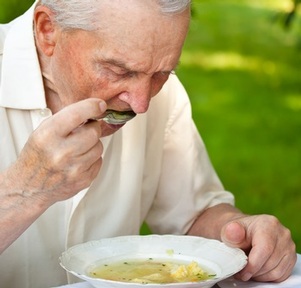Older people living alone at risk of malnutrition because they can't use kitchen safely
Almost a third of older people are not using their kitchen because they cannot get to it safely, according to a poll by Care UK.

A survey by the care home provider of 1,000 people with parents over the age of 70, reveals mum or dad maybe at risk of malnutrition with one in six older people skipping at least one meal a day.
The survey suggests part of the problem is mobility and safety around the home with responses suggesting almost a third of older people or those living with dementia, do not cook for themselves because they cannot reach or use their kitchen safely.
More than two million elderly people feel trapped in their homes with 38 per cent not fully using their entire house and one fifth unable to go up and down their stairs safely. Of the 1,000 respondents, almost half said their elderly parent lives alone.
The research follows a recent report by the Malnutrition Task Force which indicated that more than one million older people could be at risk of malnutrition.
One third of Care UK's poll respondents admitted their parent needed help food shopping and struggled to do even simple household tasks in their home. One fifth of respondents have noticed their mum or dad eating smaller portions than everyone else and one tenth have seen them missing meals in favour of a snack.
Pauline Houchin, a nurse with 30 years of experience in older people’s care who works for Care UK said: “It is easy to overlook the fact that many older people living in their own homes can be in danger of malnutrition. “We see many people who, when they arrive at our care homes, are in a malnourished state - often because they’ve been living in their own home and dementia or their declining health means it has been hard for them to get access to nutritious meals.
"Apart from the obvious loss of weight, older people suffering from poor nutrition or hydration are more prone pressure sores and urinary tract infections, find it much harder to recover from illness, infections or surgery, are more likely to have a fall and can often experience confusion."
Care UK has chosen Nutrition and hydration week to launch an advice booklet to give families, neighbours and friends the knowledge they need to stop frail, older people becoming malnourished and dehydrated.
Care UK, which runs over 100 care homes, has drawn on its own experience to produce it ‘Eating as we age’ guide, which suggests other ways to access meals without cooking from scratch, how to restore an older person’s interest in food, how to adapt meals so that they contain more calories and nutrients and even how to tackle the cravings for salty or sweet foods that are common in people with dementia.
Pauline Houchin added: “We often find that, once our chefs and carers work with new residents to get them properly nourished with plenty of fluids, their other conditions such as urinary tract infections or difficulty with walking can become less severe or even clear up altogether. I hope that by sharing our expertise with the wider community, we will be able to help people living in their own homes to avoid developing some of these conditions in the first place. ”
To read the ‘Eating as we age’ guide visit: www.careuk.com/care-homes/sites/rcs/files/Eating-as-we-age_CareUK.pdf
Latest News
 29-Jul-24
Dementia Bus gives carehome.co.uk staff insight into life with dementia
29-Jul-24
Dementia Bus gives carehome.co.uk staff insight into life with dementia
 01-Mar-24
Find out the top care homes in 2024
01-Mar-24
Find out the top care homes in 2024
 21-Mar-23
UK's top care homes in 2023 revealed
21-Mar-23
UK's top care homes in 2023 revealed
 03-Jan-23
carehome.co.uk launches free care helpline
03-Jan-23
carehome.co.uk launches free care helpline
 13-Dec-22
5 mins with Emily Whitehurst, chief operating officer for Constantia Healthcare
13-Dec-22
5 mins with Emily Whitehurst, chief operating officer for Constantia Healthcare